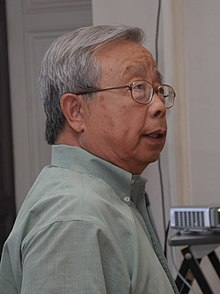Fang Lizhi | |||||||||
|---|---|---|---|---|---|---|---|---|---|
| 方励之 | |||||||||
 Fang Lizhi in 2010 | |||||||||
| Born | February 12, 1936 Beijing, China | ||||||||
| Died | April 6, 2012 (aged 76) Tucson, Arizona, U.S. | ||||||||
| Alma mater | |||||||||
| Occupation | Astrophysicist | ||||||||
| Known for | 1986 Student Demonstrations | ||||||||
| Spouse |
Li Shuxian (m. 1961) | ||||||||
| Chinese name | |||||||||
| Traditional Chinese | 方勵之 | ||||||||
| Simplified Chinese | 方励之 | ||||||||
| |||||||||
Fang Lizhi (Chinese: 方励之; pinyin: Fāng Lìzhī; February 12, 1936 – April 6, 2012) was a Chinese astrophysicist, vice-president of the University of Science and Technology of China, and activist whose liberal ideas inspired the pro-democracy student movement of 1986–87 and, finally, the Tiananmen Square protests of 1989.[1] Fang was considered as one of the leaders of the New Enlightenment in the 1980s.[2] Because of his activism, he was expelled from the Chinese Communist Party in January 1987.[3] For his work, Fang was a recipient of the Robert F Kennedy Human Rights Award in 1989, given each year.[4] He was elected an academician of the Chinese Academy of Sciences in 1980, but his position was revoked after 1989.
- ^ Yam, P. (1994) Profile: Fang Lizhi – Fundamental Rights, Fundamental Physics, Scientific American 270(5), 39-40.
- ^ Wang, Dan (April 15, 2012). "王丹:方励之是80年代启蒙时期的代表人物". Radio France Internationale (in Chinese). Retrieved October 4, 2024.
- ^ "Home". The New York Review of Books. Retrieved April 14, 2016.
- ^ "Robert F Kennedy Center Laureates". Archived from the original on April 7, 2014.